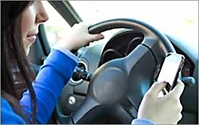
Sorry,
automotive multitaskers, but hands-free, voice-controlled technology may not be any safer than actually picking up your phone. Indeed, it may actually be more dangerous, according to a new study by
the AAA and the University of Utah.
Researchers used test vehicles equipped with instruments to record driver actions, as well as heart-rate monitors and other tools to measure reaction times, to
determine how distracted drivers were while attempting to perform various activities. The study included distraction tests using Siri, the popular voice-controlled function integrated into Apple
iPhones. They then assigned each activity a number based on a distraction index of one to five, with higher numbers indicating more distraction.
The study found that composing texts and emails
using in-vehicle, voice-controlled technology scored a three out of five on the distraction index, while using Apple’s Siri (version iOS 7) in order to perform common tasks like interacting with
social media or updating calendars generated a score of four, indicating serious distraction.
advertisement
advertisement
In fact, two participants experienced virtual crashes while trying to use Siri, which the authors
observed often produced different responses to the same command. For comparison, listening to the radio scored just one out of five on the distraction index, while talking on a handheld or hands-free
cell phone scored two out of five.
The researchers also tested a number of in-dash media and navigation systems in use in cars today. They found them too complicated and error-prone, once
again resulting in high levels of distraction. Chevrolet’s MyLink system scored the worst, with a distraction rating of 3.7. Not far behind were Mercedes’ Command, at 3.1; Ford’s
Sync with MyFord Touch, at 3.0; and Chrysler’s UConnect, at 2.7. Toyota’s Entune and Hyundai’s BlueLink were a bit better, at 1.7 and 2.2, respectively.
AAA chief executive
Bob Darbelnet observed: “We already know that drivers can miss stop signs, pedestrians and other cars while using voice technologies. We now understand that current shortcomings in these
products, intended as safety features, may unintentionally cause greater levels of cognitive distraction.”
University of Utah psychology professor David Strayer emphasized: “The
primary task should be driving. Things that take your attention away make you a poor driver. Even though your car may be configured to support social media, texting and phone calls, it doesn't mean it
is safe to do so.”